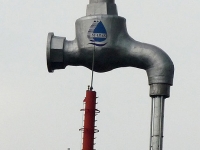Malaysian Water Company Claims To Have Run Dry

Syabas, a private water company in Malaysia, has threatened to start water rationing in the state of Selangor after claiming that it had almost no water reserves left. The local government has called foul and critics claim that the threat is a ploy to win more lucrative contracts and to favor a rival political party.
"Here, we have a corporation holding a state government and public to ransom," Charles Santiago, the coordinator of the Coalition Against Water Privatisation who is also a local member of parliament, told Free Malaysia Today. "The truth is not coming out. They have vested interest to overthrow the state."
Selangor is the richest and most populous state in Malaysia with over seven million inhabitants and many of the country's key industries in the area surrounding the national capital of Kuala Lumpur. It is governed by Pakatan Rakyat (PR) parties, an opposition coalition.
Syabas (which is short for Syarikat Bekalan Air Selangor) has a monopoly on providing water to Selangor. The company won a 30 year contract to provide water in December 2004 when the ruling Barisan National coalition privatized the state water supply.
Rozali Ismail, the treasurer for the United Malays National Organisation (UMNO) party in Selangor, owns 40 percent of Puncak Niaga Berhad, which in turns owns 70 percent of Syabas. UMNO is one of the key members of Barisan National.
Syabas is now lobbying heavily to raise rates for water but the Selangor government is insisting that the company first reduce the rate of "non-revenue water" which amounts to 30 percent of treated water.
Another option is the construction of a new RM3.6 billion ($1.15 billion) Langat 2 water treatment plant which is also likely to benefit Syabas and its affiliates.
"From what I understand from my industry sources, Umno boys are getting a lot of the contracts," says Santiago. "I am talking about contracts for things like laying the pipes to others. Industry sources also tell me that Puncak Niaga is also getting the contract to operate and manage this."
Tony Pua, another opposition politician, says that Barisan National wants to use the water issue as a way to prove that the state is being mismanaged. "They want to influence the course of the elections. They have a monopoly over water resources and are holding the people to ransom," Pua told Reuters.
"(I)n Selangor, the private concession companies chosen to treat and distribute water were not skilled nor experienced in the water services industry," Khalid Ibrahim, the chief minister of Selangor, told the Sixth World Water Forum in Marseille, France, in March. "There should have been specific and detailed clauses providing penalties for the companies' failure to comply with conditions. In our case, the agreement was so flawed that when the distributor experienced financial difficulties, the government eventually underwrote the companies' debts."
Others say that the idea that water privatization will serve the public better is simply untrue. "Proponents of privatization consistently argue that it saves costs due to competitive pressures private providers face to be more efficient," writes Mildred E. Warner for the Trans National Institute in the Hague. Yet the reality is quite different. "The majority of the studies (11) found no difference in costs between public and private production," she adds.
For example, Manila Water and Maynilad, two private corporations have run the water supply of eastern and western Manila since 1997. "Since then, water prices have soared, with increases between 450% - 850% for residents of each zone," writes Corporate Accountability International. "Quality has suffered, with severe public health consequences, and the much-needed infrastructure investment which was used to justify the privatization has failed to materialize."
The same was true in Jakarta where PT PAM Lyonnaise Jaya (Palyja) manages the west part of the city and PT Aetra Air Jakarta (Aetra) manages the east part. (Palyja's major shareholder is Suez Environment, a French water company while Aetra is currently owned by Acuatico Ltd, a company based in Singapore)
"Citizens in Jakarta are suffering from unimproved services, high prices, bad quality of water and environmental deterioration," writes Irfan Zamzami of the Amrta Institute for Water Literacy. Zamzami predicts that the city will soon owe the companies 18.2 trillion rupiah. ($2.04 billion). "(W)ater service should be re-municipalized. This is a global trend and needs international solidarity to prevent citizens of the world from a privatized and inaccessible water service."
- 190 Natural Resources



